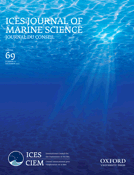
ICES JOURNAL OF MARINE SCIENCE
Scope & Guideline
Connecting Science to Sustainable Practices in Marine Research
Introduction
Aims and Scopes
- Marine Ecosystem Dynamics:
The journal publishes research on the interactions and dynamics within marine ecosystems, including trophic relationships, community structure, and environmental influences. - Fisheries Science and Management:
A core area of focus includes studies on fisheries management practices, stock assessments, and the socio-economic implications of fishing activities. - Climate Change Impacts:
Research addressing the effects of climate change on marine species, habitats, and ecosystems, as well as adaptive management strategies to mitigate these impacts. - Technological Innovations in Marine Science:
The journal highlights novel methodologies and technologies, such as acoustic monitoring, genetic tools, and artificial intelligence applications in marine research. - Conservation and Biodiversity:
Studies aimed at understanding and preserving marine biodiversity, including assessments of vulnerable species and habitats, are prominently featured. - Policy and Governance:
Research that informs policy decisions and governance frameworks for sustainable marine resource management, particularly in the context of international agreements.
Trending and Emerging
- Climate Change and Marine Ecosystems:
An increasing number of studies are focusing on the impacts of climate change on marine ecosystems, including shifts in species distributions, phenology, and ecosystem dynamics. - Integrated Ecosystem Assessments:
There is a growing trend towards integrated ecosystem assessments that combine ecological, social, and economic data to inform sustainable management practices. - Use of Advanced Technology in Research:
Emerging methodologies utilizing technologies such as remote sensing, genetic sequencing, and machine learning are gaining traction in marine research, improving data collection and analysis. - Social-Ecological Systems and Human Dimensions:
Research examining the interplay between ecological and social systems, including stakeholder engagement and community-based management strategies, is becoming more prominent. - Conservation Strategies for Marine Biodiversity:
The journal is increasingly publishing studies that propose innovative conservation strategies aimed at protecting marine biodiversity and mitigating human impacts.
Declining or Waning
- Traditional Fisheries Techniques:
There is a noticeable decrease in studies focusing on traditional fisheries techniques, as the field shifts towards integrating modern technologies and methodologies for better management outcomes. - Regional Case Studies:
Research centered on localized case studies has waned, with a growing emphasis on broader, more global perspectives and comparative studies across regions. - Single-Species Management Approaches:
The focus on single-species management is declining as the field moves towards ecosystem-based management approaches that consider multi-species interactions and broader ecological contexts. - Descriptive Studies without Management Implications:
There is a reduction in purely descriptive studies that do not provide actionable insights for fisheries management or conservation strategies. - Historical Fisheries Practices:
Research on historical fisheries practices is becoming less frequent as the journal emphasizes contemporary challenges and solutions in marine science and fisheries management.
Similar Journals
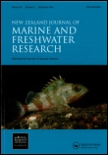
NEW ZEALAND JOURNAL OF MARINE AND FRESHWATER RESEARCH
Championing Ecological Research for Tomorrow's ChallengesNEW ZEALAND JOURNAL OF MARINE AND FRESHWATER RESEARCH, published by Taylor & Francis Ltd, stands as a distinguished platform for the dissemination of innovative research in the realms of aquatic science and ecology. With an ISSN of 0028-8330 and E-ISSN 1175-8805, this journal has been curating significant scientific contributions since its inception in 1967, continuing through to 2024. Recognized in the Q2 category across multiple relevant fields—including Aquatic Science, Ecology, and Water Science—this journal ranks notably in Scopus, with a 74th percentile for Ecology, Evolution, Behavior and Systematics, highlighting its impact and relevance within the scientific community. Though not an open-access publication, its rigorous peer-reviewed articles offer insights that resonate with researchers, professionals, and students who are passionate about advancing our understanding of freshwater and marine ecosystems. By fostering a collaborative space for ecological and environmental inquiries, the NEW ZEALAND JOURNAL OF MARINE AND FRESHWATER RESEARCH is essential for those aiming to contribute to the vital conversations around biodiversity, conservation, and sustainable management of aquatic resources.
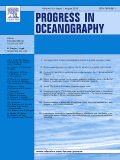
PROGRESS IN OCEANOGRAPHY
Inspiring Insights into Marine EcosystemsPROGRESS IN OCEANOGRAPHY is a pivotal journal published by PERGAMON-ELSEVIER SCIENCE LTD, dedicated to advancing the field of oceanographic research and exploration. With an ISSN of 0079-6611 and an E-ISSN of 1873-4472, this esteemed publication has been disseminating significant findings from 1963 and continues to be a cornerstone in aquatic sciences and geology, holding a distinguished Q1 ranking in both categories as of 2023. The journal primarily focuses on innovative research that contributes to our understanding of ocean processes, marine ecosystems, and the impact of human activities on the oceans. Its exclusive access model facilitates the dissemination of high-quality content that resonates with researchers, professionals, and students alike, ensuring that vital insights are accessible to the global scientific community. With a firm commitment to upholding rigorous scientific standards, PROGRESS IN OCEANOGRAPHY remains an influential platform for the communication of groundbreaking research, providing scholars with invaluable resources to drive future oceanographic studies.
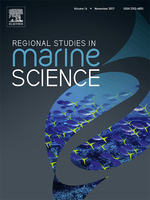
Regional Studies in Marine Science
Exploring the Depths of Marine EcosystemsRegional Studies in Marine Science, published by Elsevier, is a leading academic journal dedicated to advancing the understanding of marine ecosystems and their regional dynamics since its inception in 2015. With an ISSN of 2352-4855, this journal is indexed in Scopus and has achieved impressive ranking quartiles, notably Q2 in categories like Animal Science and Zoology, and Ecology, showcasing its relevance and impact in these fields. As of 2023, it ranks in the 79th percentile for Animal Science and Zoology, reflecting its significant contribution to academic discourse. While the journal operates under a traditional access model, its rigorous peer-review process ensures the publication of high-quality research that is crucial for understanding ecological interactions and fostering sustainable practices within marine environments. Researchers, professionals, and students alike will find this journal an invaluable resource for the latest findings and advancements in marine science, as it strives to bridge the gap between research and practical application at regional and global levels.
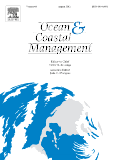
OCEAN & COASTAL MANAGEMENT
Innovating Solutions for Coastal ManagementOCEAN & COASTAL MANAGEMENT is a premier journal dedicated to the multifaceted fields of oceanography, aquatic science, and coastal management. Published by ELSEVIER SCI LTD and located in the United Kingdom, this esteemed journal boasts a remarkable Q1 ranking in prestigious categories, including Aquatic Science and Oceanography, reflecting its influential contributions to the field since its inception in 1992. The journal is recognized for its high impact, boasting a commendable presence in Scopus rankings across related disciplines, with notable placements in the 94th percentile for Aquatic Science and 92nd percentile for Oceanography. Although it operates under a subscription model, OCEAN & COASTAL MANAGEMENT continues to serve as a vital resource for researchers, professionals, and students seeking to advance their understanding of coastal ecosystems and effective management strategies. Through rigorous peer-reviewed research, the journal aims to foster knowledge exchange and practical applications in policy-making and environmental stewardship, making it an essential read for anyone engaged in the preservation and sustainable use of oceanic resources.
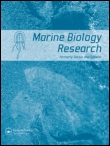
Marine Biology Research
Advancing marine science for a sustainable future.Marine Biology Research is a premier journal published by Taylor & Francis, focusing on the dynamic field of marine biology and its intersecting realms of aquatic science, ecology, and oceanography. Since its inception in 2005, this journal has served as a crucial platform for researchers and professionals to disseminate their findings, with a vision extending to 2024 and beyond. The journal is recognized with a Q3 quartile ranking in both Aquatic Science and Ecology, Evolution, Behavior and Systematics, underscoring its growing influence in these fields as evidenced by its Scopus rankings. Located in the United Kingdom, Marine Biology Research aims to foster collaboration and innovation through open access options, facilitating knowledge exchange among the academic community. With a steady commitment to advancing marine sciences, this journal is an invaluable resource for those dedicated to understanding and preserving our ocean ecosystems.

MARINE AND FRESHWATER RESEARCH
Unveiling the mysteries of our waters.Marine and Freshwater Research is a prestigious journal published by CSIRO PUBLISHING that serves as a key platform for the dissemination of cutting-edge research in the fields of Aquatic Science, Ecology, and Oceanography. With an impactful presence since its inception in 1948, the journal provides critical insights into the dynamics of freshwater and marine ecosystems, promoting interdisciplinary approaches that contribute to our understanding of biodiversity and sustainability. Currently ranked in the Q2 category across major scientific domains, including Ecology and Aquatic Science, it enjoys a robust academic reputation supported by impressive Scopus rankings, such as Rank #66/247 in Aquatic Science and Rank #44/145 in Oceanography, reflecting its high citation impact and relevance. While offering a subscription-based access model, the journal remains dedicated to fostering dialogue and innovation within the scientific community, aiming to bridge the gap between research findings and practical applications in environmental management. Located in Australia, Marine and Freshwater Research is an essential resource for researchers, professionals, and students dedicated to exploring the complexities of aquatic ecosystems and advocating for their preservation.

REVISTA DE BIOLOGIA MARINA Y OCEANOGRAFIA
Connecting Scholars to the Wonders of the SeaREVISTA DE BIOLOGIA MARINA Y OCEANOGRAFIA is a prominent academic journal dedicated to the fields of marine biology and oceanography, published by the Faculty of Marine Sciences and Natural Resources at Universidad de Valparaíso, Chile. Since its inception in 1996, this journal has been a vital platform for disseminating research findings and advancements in aquatic sciences, covering a breadth of topics relevant to the marine environment. With its current impact positioned within the Q4 quartile of both Aquatic Science and Oceanography categories in 2023, the journal serves as an essential resource for scholars, practitioners, and students alike, aiming to enhance their understanding of marine ecosystems. While the journal does not provide open access options, it continues to contribute valuable insights, helping to foster a deeper appreciation for oceanographic science and marine biodiversity. Located in the scenic city of Viña del Mar, Chile, this publication invites manuscripts that push the boundaries of knowledge and stimulate discourse within the marine sciences community, thereby promoting sustainable management and conservation of oceanic resources.
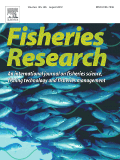
FISHERIES RESEARCH
Advancing aquatic science for sustainable futures.Fisheries Research, published by Elsevier, is a leading international journal dedicated to the advancement and dissemination of research in the field of aquatic science. With an ISSN of 0165-7836 and E-ISSN 1872-6763, this influential journal has been pivotal in shaping fisheries management and conservation strategies since its inception in 1981. As a distinguished publication ranked in the Q1 category for Aquatic Science in 2023, it holds a prestigious position, reflected in its Scopus ranking of 73/247 in Agricultural and Biological Sciences. Fisher fisheries research encompasses a diverse array of topics such as fish population dynamics, ecosystem management, and sustainable practices, making it an essential resource for researchers, professionals, and students alike. Although it currently does not offer Open Access, the journal remains a crucial platform for disseminating high-quality research and fostering dialogue within the aquatic science community. With its address at Radarweg 29, 1043 NX Amsterdam, Netherlands, Fisheries Research continues to contribute significantly to the global discourse on fisheries science and management.

BULLETIN OF MARINE SCIENCE
Fostering a deeper understanding of marine ecosystems.BULLETIN OF MARINE SCIENCE, published by Rosenstiel School of Marine and Atmospheric Science, is a prominent journal dedicated to advancing the field of marine science through scholarly research and peer-reviewed articles. With an ISSN of 0007-4977 and an E-ISSN of 1553-6955, this journal has been contributing to significant scientific discourse since its inception in 1973. Covering a wide spectrum of topics in aquatic sciences and oceanography, it has maintained a respectable position in the academic community, as evidenced by its Q3 ranking in both categories for 2023. Although currently not an open-access journal, it provides essential access to groundbreaking research that informs marine conservation, ecological studies, and atmospheric sciences. Situated in the United States at 4600 Rickenbacker Causeway, Miami, FL 33149, the journal serves as a vital resource for researchers, professionals, and students seeking to engage with the latest findings in marine science and foster a deeper understanding of our oceans.

Indian Journal of Geo-Marine Sciences
Unveiling the Secrets of Oceanography and GeosciencesThe Indian Journal of Geo-Marine Sciences, published by the NATIONAL INSTITUTE OF SCIENCE COMMUNICATION & INFORMATICS (NISCAIR), serves as a vital platform dedicated to the dissemination and advancement of knowledge in the field of marine and geosciences. As an open-access journal, it allows for improved visibility and accessibility of research findings to a global audience, enabling researchers, professionals, and students to share insights into oceanography and related disciplines. With a publication history spanning from 2007 to 2010 and continuing from 2012 to 2024, it has established itself within the academic community as a reliable source of innovative research, despite being classified in Q4 of Oceanography and holding a Scopus rank that places it in the 27th percentile. This journal is particularly relevant for those investigating marine ecosystems, geological oceanography, and their interconnections, thus playing an essential role in fostering understanding and communication within this important area of scientific inquiry.